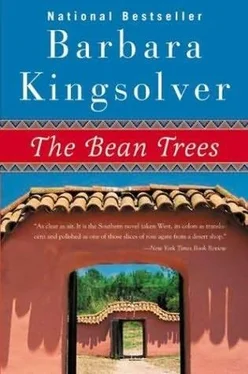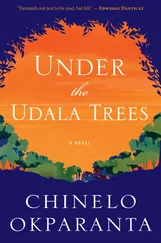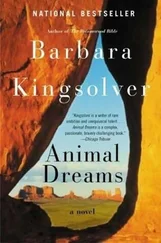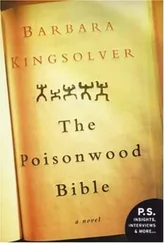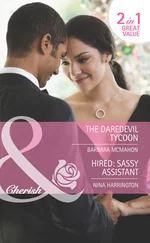The sight of it filled me with despair. I turned south from Wichita, Kansas, thinking I might find a way around it, but I didn’t. There was central Oklahoma. I had never imagined that any part of a round earth could be so flat. In Kentucky you could never see too far, since there were always mountains blocking the other side of your view, and it left you the chance to think something good might be just over the next hill. But out there on the plain it was all laid out right in front of you, and no matter how far you looked it didn’t get any better. Oklahoma made me feel there was nothing left to hope for.
My car gave out somewhere in the middle of a great emptiness that according to the road signs was owned by the Cherokee tribe. Suddenly the steering wheel bore no relation to where the car was going. By the grace of some miracle I surely did not yet deserve, I managed to wobble off the highway all in one piece and find a service station.
The man who straightened out my rocker arm was named Bob Two Two. I am not saying he didn’t ask a fair price-I should have been able to fix it myself-but he went home that night with his pocket full of something near half the money I had. I sat in the parking lot looking out over that godless stretch of nothing and came the closest I have ever come to cashing in and plowing under. But there was no sense in that. My car was fixed.
I had to laugh, really. All my life, Mama had talked about the Cherokee Nation as our ace in the hole. She’d had an old grandpa that was full-blooded Cherokee, one of the few that got left behind in Tennessee because he was too old or too ornery to get marched over to Oklahoma. Mama would say, “If we run out of luck we can always go live on the Cherokee Nation.” She and I both had enough blood to qualify. According to Mama, if you’re one-eighth or more they let you in. She called this our “head rights.”
Of course, if she had ever been there she would have known it was not a place you’d ever go to live without some kind of lethal weapon aimed at your hind end. It was clear to me that the whole intention of bringing the Cherokees here was to get them to lie down and die without a fight. The Cherokees believed God was in trees. Mama told me this. When I was a kid I would climb as high as I could in a tree and not come down until dinner. “That’s your Indian blood,” she would say. “You’re trying to see God.”
From what I could see, there was not one tree in the entire state of Oklahoma.
The sun was headed fast for the flat horizon, and then there would be nothing but twelve hours of headlights in front of me. I was in a hurry to get out of there. My engine was still running from Bob Two Two’s jumper cables, and I hated to let a good start go to waste, but I was tired and didn’t want to begin a night of driving without a cup of coffee and something to eat. I drove across the big patch of dirt that lay between the garage and another small brick-shaped building that had a neon Budweiser light in the window.
When I drove around to the front, a swarm of little boys came down on my car like bees on a bear.
“Wash your windows, lady,” they said. “Dollar for the whole car.”
“I got no windows,” I told them. I reached back and put my hand through the side window hole to show them. “See, just the windshield. Lucky me, because I got no dollar either.”
The boys went around the car putting their hands through all the window holes again and again. I thought twice about leaving my stuff in the car while I went into the restaurant. I didn’t have anything worth taking, but then it was all I had.
I asked them, “You boys live around here?”
They looked at each other. “Yeah,” one of them said. “He does. He’s my brother. Them two don’t.”
“You ever hear of a Polaroid memory?”
The big one nodded. The others just stared.
“Well, I got one,” I said. “It’s just like a camera. My memory just took a picture of what y’all look like, so don’t take any stuff out of my car, okay? You take any stuff, you’re in for it.”
The kids backed off from the car rubbing their hands on their sides, like they were wiping off anything their hands might have already imagined grabbing onto.
After the cool night, the hot air inside the bar hit me like something you could swim through. Near the door there was a wire rack of postcards. Some had Indians in various hokey poses, but most were views-from-the-air of Oral Roberts University, which apparently was in the vicinity-although I’m pretty sure if it had been within two hundred miles I could have seen it from the parking lot.
I picked out one with two Indian women on it, an older and a younger, pretty one, standing side by side next to some corn-grinding thing. I had often wondered which one-eighth of me was Cherokee, and in this picture I could begin to see it. The long, straight hair and the slender wrist bones. The younger one was wearing my two favorite colors, turquoise and red. I would write on it to Mama, “Here’s us.”
I sat down at the counter and gave the man a dime for the postcard. I nodded when he pointed the pot of coffee at me, and he filled my cup. The jukebox was playing Kenny Rogers and the TV behind the counter was turned on, although the sound was off. It was some program about, or from, Oral Roberts University, which I recognized from the postcards. Frequently a man with clean fat hands and a crest of hair like a woodpecker would talk on and on without sound. I presumed this was Oral Roberts himself, though of course I can’t say for certain that it was. From time to time a line of blue writing would run across the bottom of the screen. Sometimes it gave a telephone number, and sometimes it just said “Praise the Lord.” I wrote my postcard to Mama. “Grandpa had the right idea,” I told her. “No offense, but the Cherokee Nation is crap. Headed west. Love, M.” It didn’t seem right just yet to sign it Taylor.
The place was cleared out except for two men at the counter, a white guy and an Indian. They both wore cowboy hats. I thought to myself, I guess now Indians can be cowboys too, though probably not vice versa. The Indian man wore a brown hat and had a brown, fine-looking face that reminded me of an eagle, not that I had ever actually seen an eagle. He was somewhere between young and not so young. I tried to imagine having a great grandpa with a nose like that and such a smooth chin. The other one in the gray hat looked like he had a mean streak to him. You can tell the kind that’s looking for trouble. They were drinking beers and watching Oral on the silent TV, and once in a great while they would say something to each other in a low voice. They might have been on their first couple of beers, or they might have been drinking since sunup-with some types you can’t tell until it’s too late. I tried to recall where I had been at sunup that day. It was in St. Louis, Missouri, where they have that giant McDonald’s thing towering over the city, but that didn’t seem possible. That seemed like about a blue moon ago.
“You got anything to eat that costs less than a dollar?” I asked the old guy behind the counter. He crossed his arms and looked at me for a minute, as if nobody had ever asked him this before.
“Ketchup,” the gray-hat cowboy said. “Earl serves up a mean bottle of ketchup, don’t you, Earl?” He slid the ketchup bottle down the counter so hard it rammed my cup and spilled out probably five cents’ worth of coffee.
“You think being busted is a joke?” I asked him. I slid the bottle back and hit his beer mug dead center, although it did not spill. He looked at me and then looked back to the TV, like I wasn’t the kind of thing to be bothered with. It made me want to spit nails.
“He don’t mean nothing by it, miss,” Earl told me. “He’s got a bug up his butt. I can get you a burger for ninety-nine cents.”
Читать дальше
